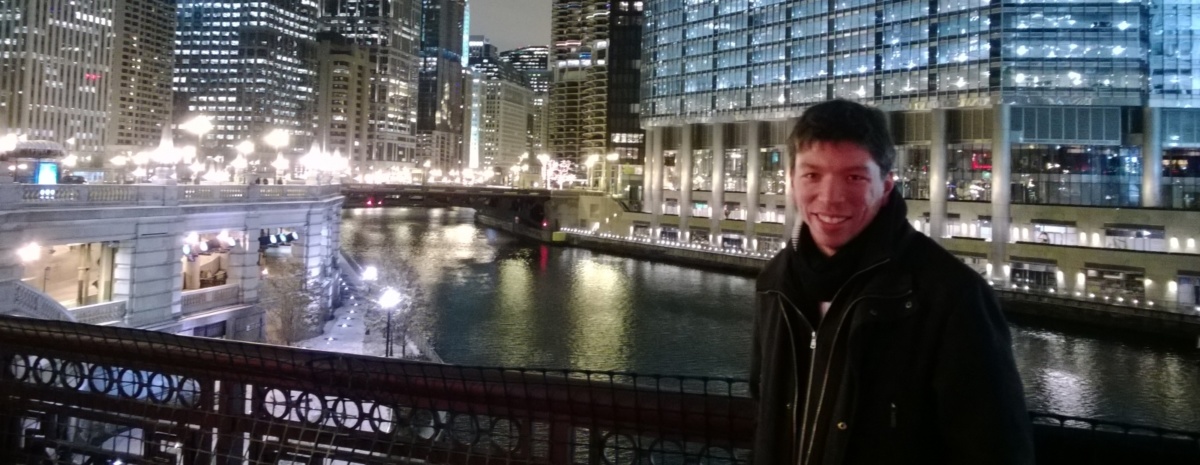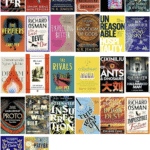
The 606 (with guests)
A smorgasbord of things to post about:
- Improv comedy featuring fellow megachurch attendee Kannan in Fucked Up Family Reunion. Sadly my family isn’t nearly interesting enough to qualify, but another audience member stepped up to the plate to provide material.
- Take the Armenian genocide, mix with a dysfunctional marriage and you get Beast on the Moon – an unsurprisingly intense play about two survivors living in 1920s Milwaukee. Bonus theatre points: the playwright turned out to be sitting behind us.
- Hayao Miyazaki’s swansong, The Wind Rises, was first released in 2013 but Katie tipped me off to a showing and I was delighted to catch it in the cinema. Like his other films that I’ve seen, My Neighbour Totoro and Spirited Away, the imagination and wandering narrative is quite different to most Hollywood films, and the film’s thoughtful and nuanced approach to Japanese engineering during WW2 is probably evidence that ‘losing’ countries make better art. Plus the short, angry boss character is quite wonderful.
- After another term of SPARK mentoring, I attended another ‘Discovery Night’ where students in the programme present their projects to classmates and parents. Huge thanks to Katie for stepping in midway through to mentor!
- At Simon’s suggestion, Randi and I caught the Chicago leg of Scott Bradlee’s Postmodern Jukebox tour – vintage covers of Taylor Swift, One Direction, Magic! and more. It was a lot of fun, even from the nosebleeds.
- We also saw Ex Machina (along with Kevin and Nolan) which was creepy, wonderful, and left me deeply disturbed and distrusting of everyone around me in case they were actually vengeful robots with AI.
- And finally, today was 06/06/2015 – or, in American dating formatting, 06/06/2015. Which was nice, because (a) it doesn’t make my new t-shirt look stupid, and (b) it was also the opening day of Chicago’s new elevated ‘Bloomingdale Trail’ or ‘The 606‘. Basically, it’s like New York’s High Line, but in Chicago, and about double the length at 3 miles (so there). Opening day was fortuitously sunny and pulled in large, good-natured crowds with some very reasonably priced beer, live music and some free memorabilia. Looking to take a Chicago visitor on a good stroll? It’s been a long time coming, but the 606 has finally arrived, and it’s a pretty great addition to the city below.
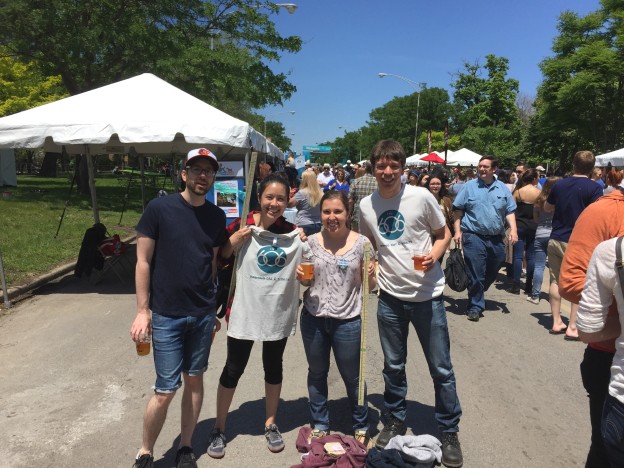
At the 606 launch with Randi, Katie and Brandon
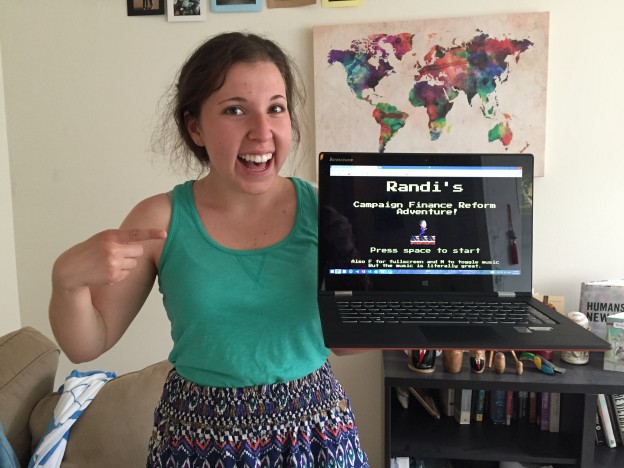
Campaign Finance Reform! In game form!
For Randi’s birthday on Sunday, I thought it would be fun to make a video game. (That might sound crazy, but she thought it would be fun to run a half-marathon: at least my craziness can be done sitting down.) To do this I chose Construct 2, a lovely bit of software from London-based start-up Scirra. It took a couple of weeks to get the whole thing done, but the learning curve is gentle and the basics quickly understood. If you’ve ever had the itch to make a game yourself, this is an easy yet flexible way of doing so.
I still get tingles from the power of the tools available to us today. It’s something I see with the kids I mentor with, too – with a little effort, it’s remarkably easy to quickly pull together a project which would have required feats of organisation and specialist equipment in the past. I can just about remember doing a primary school assignment on Greece, say, with an out-of-date edition of Encyclopaedia Britannica, a Compton’s CD-ROM and possibly a colour printer if it wasn’t out of ink.
This makes me sound so old, I know.
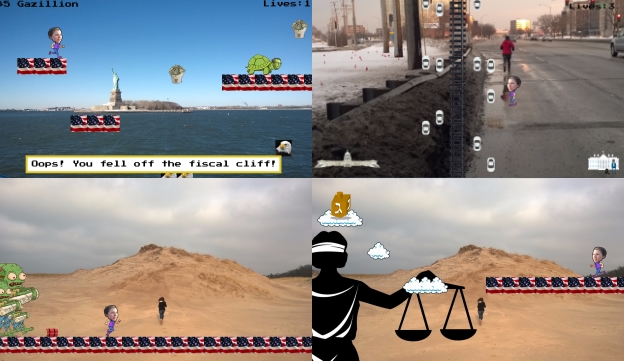
Collect cash, beat turtles, avoid cars, kill zombies and more
Tomorrow night we embark on a long Memorial Day weekend to the West Coast, knocking out two more states from my travel list. I can’t promise to get to 50, but I can try 😀
Well.
Five years ago, I posted some photos of the election night drinking and party games we kept busy with as the unhappy outcome rolled forward. So in the spirit of consistency:
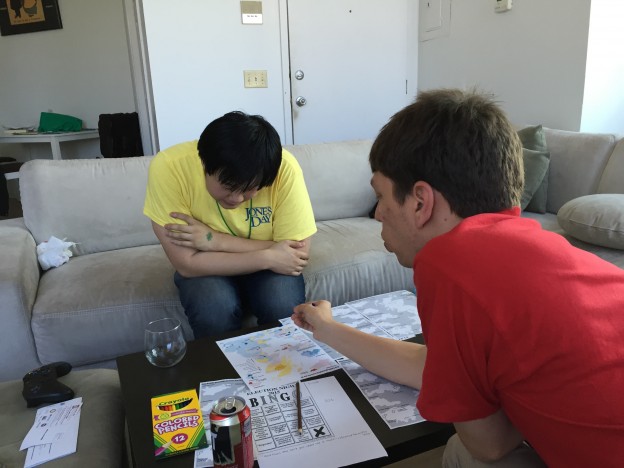
Trying to explain to Jason why we weren’t all that interested in Plaid Cymru
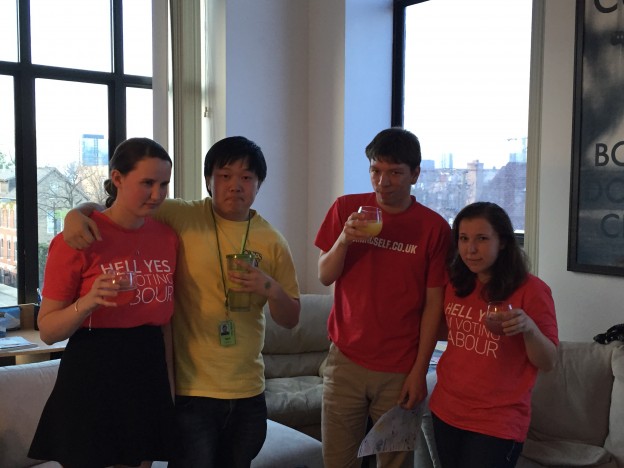
Exit poll sadness
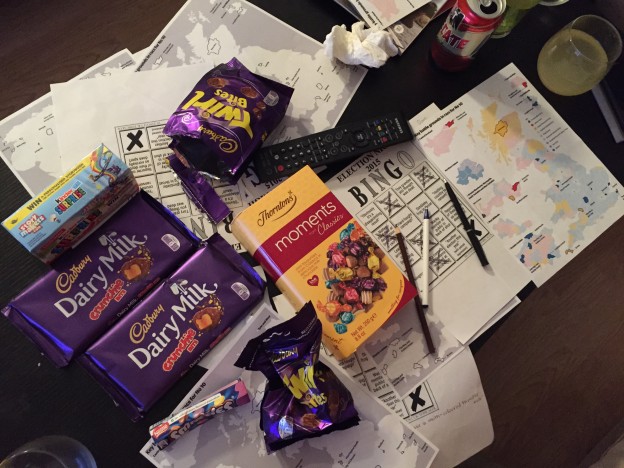
As the night wore on, some imported British chocolate became necessary
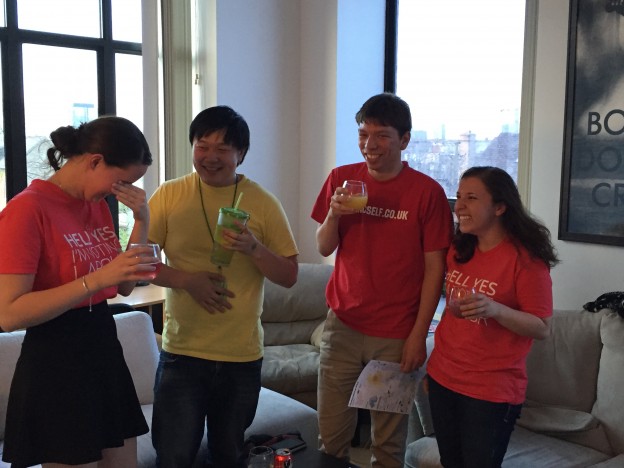
Cameron cracks a gag about being a One Nation Tory
Last time I also managed to see the positive side. It’s not something I can really repeat this time. It’s almost the worst possible result: a Tory majority, but not so big that Cameron won’t be beholden to the madder fringes of his backbenchers, and with no moderating influence. The Scottish rift will be used to further cement Conservative power in England, if it doesn’t end the Union entirely. And in two years, we’ll teeter on the brink of isolation from Europe. Quite frankly, it’s enough to sit in exile in the US for a while…
At least Galloway’s gone.
It was fun introducing Americans to some of the stalwarts of British general elections on the BBC: David Dimbleby, public constituency counts, joyously absurd graphics (the Lib Dem house of cards a particular favourite this time around) and lost deposits. (One unfortunate Lib Dem candidate in Essex secured a miserable 80 votes: surely you’d just know more than that in person?) I also realised that all three constituencies I’ve lived in are now Labour, which says something for the happier circles I inhabit. London Independence Party, anyone?
Very much enjoyed seeing John in The Upstairs Concierge last week. It didn’t get great reviews, but I was just so pleased and so ready to see a farce again – and I even followed along with most of the baseball references!
Speaking of farce – it’s almost time for the UK election. Five years ago I posted my first general election vote and crossed my fingers it would actually get there, and this time around I’ll be relying on my mother to vote by proxy on my behalf. (I’ll have to take it on trust that she doesn’t slip up and accidentally vote for UKIP or something.) I’m still looking forward to the day when I can actually do it the ‘proper’ way with a pencil and a cross and a cheerful looking volunteer at the polling station who’s just pleased that someone has turned up, but – in compensation – I do get the nerdish excitement at six extra hours of BBC election night coverage before I give up and go to sleep. Thank you, timezones.
With less than a week to go, then, here are some thoughts:
- I am pleased with Ed Miliband’s performance in this campaign, especially against a tough (although pleasingly sharp) crowd on Question Time the other night. I especially respect his refusal to give in to the EU referendum bandwagon – the ‘trust the people’ soundbite is comfortable to say, but it’s also disingenuous. In a representative system, politicians should stand on a platform and argue for something. And if you really believe that a one-off referendum on the status quo trumps all other issues, don’t vote Labour. Otherwise, I urge you to give him another look.
- Watching the debates from the US, it’s a particular point of pride that – despite our many, many faults – a consensus for universal healthcare, free at the point of use, still prevails in British politics. Let’s never ruin this.
- If we are permanently in an era of multi-party politics, then the Westminster system must adapt. I’m not really sure whether this will be intrinsically ‘better’ or not, but it’s just a statement of fact: just as individual votes must be respected, then general patterns of voting must change things too. More devolution of power and budgets – not just to Scotland, but to English cities – should be part of the answer here.
Incidentally, if you check the sidebar of this blog, you’ll now see ‘anniversary posts’ from the eleven (as of last Monday) years of blogging archives. Easy nostalgia, and part of my motivation for writing this: it’ll serve as a useful reminder to future-me of what I was hoping for this time around. We’ll see.
Finally – my family lost someone very close to them last week. It’s been weighing on my mind, and I will miss her terribly. It feels a strange thing to write that for someone I barely knew, but with some people you just feel the goodness, and the fun, and the kindness. Di was someone like that – someone whose presence enticed teenage-me me to stick around and pull up a stool when my parents ‘had friends over’, because she was always worth the time. My thoughts are with her family.
I know it seems like I’ve spent all of April having religious experiences, but that is not exactly true. A few weeks back I saw Bleachers (not a religious experience, although they did have two drummers, which is a plus) and had brunch at Karol’s (not a religious experience either, although he does have a large map of the world on the wall of his apartment, which is both a plus and a great way to learn about odd little islands in the middle of the ocean which Britain still owns).
Randi and I also enjoyed watching Caius power through to win University Challenge: not just my alma mater, but a team featuring my long-lost college brother Michael! I count myself as having a good episode when I can get up to 5 correct answers, so I didn’t appreciate Will Self popping out at the end to scold viewers at home for not “taking account of the mental agility involved” to play in person. I am taking account of the mental agility, Will, and I am noting it primarily in comparison to my own incompetence.
More non-religious experiences: being treated to dinner by Sharon, who once hosted me in Washington DC many years ago when my main priority in America was to watch new episodes of The Simpsons, and seeing both Balm in Gilead and Eyes of a Thief. The former is a 1965 play following the daily rhythms of social outcasts in and around a boisterous New York café. Hard to get into at first – with lots of unconventional staging, a huge cast and overlapping dialogue – but I enjoyed the second half more.
The latter was Palestine’s Academy Awards entry this year, and I saw it with Katie as part of the Chicago Palestine FIlm Festival last night. Apparently it got some flak for ‘glorifying violence’ – it doesn’t, really, although I do find the main character a bit clean-cut and perfect given his dark past. The director said some interesting things in the Q&A about making him Christian, rather than Muslim, to emphasise Palestine’s struggle as a national rather than a religious one. That as may be, the real message of the film for me was how striking the landscape looks when you watch characters motorbike through it. It almost makes me want to visit.
But I will leave this disjointed and meandering blog post with a different kind of beauty:

One sure-fire moving team
That’s one power-team of U-Haul stackers right there. Go team.
